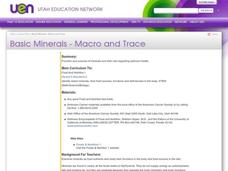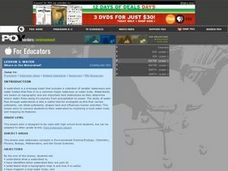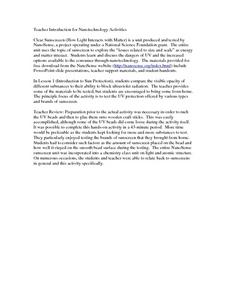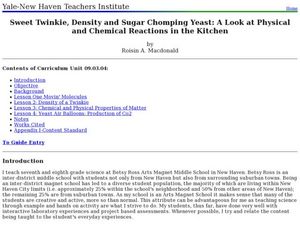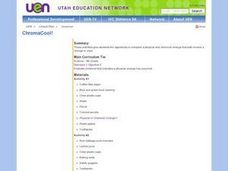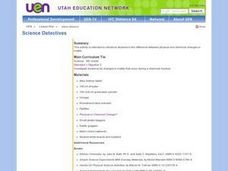Curated OER
Color Change in Leaves
Students identify the different leaf pigments and colors. In this biology lesson, students perform chromatography to separate them. They explain how light affects green leaf colors and causes falling leaves in autumn.
Curated OER
Basic Minerals - Macro and Trace
Identify minerals, their sources, functions, and deficiencies in the body. National Standard 14.2.1 Discuss macro minerals, electrolytes, and trace minerals Identify the problems associated with calcium and iron
Curated OER
Stick To It!
High schoolers compare different types of pressure sensitive adhesive tapes. They fevelop and carry out tests for variables affecting the force needed to peel tape off a surface. Students analyze the time needed to peel the tape with...
Curated OER
Water: Where in the Watershed?
Young scholars become connected to their watershed by exploring a local water body and mapping its features. They focus on how the local watershed fits into the larger scheme of the watershed.
Curated OER
Cells: Structures and Processes
Students explore the basic unit of life, the cell in this nine lessons unit. The cell structure of animal and plant cell functions and how they affect our world are probed in this unit.
Curated OER
Basic Vitamins: Water-Soluble and Fat-Soluble
High schoolers examine vitamins and study their functions and food sources. They research what happens to vitamins when foods are overcooked. They prepare a microwaveable vegetable quiche.
Curated OER
Growing Barley for Use in Biosynthesis Experiments
Students attempt to determine the optimum growing conditions for barley. They assess the effects of a number of substances such as ammonium chloride and urea on the plants
Curated OER
Rockin? Chalk (Integrating science - make own chalk)
Students use plaster of Paris, talc, and cornstarch to create their own chalk. They hypothesize what mixture of ingredients produce the "best" chalk. Students discuss what they think are the characteristics of the "best" chalk.
Curated OER
Numbers in Art
Students choose a number from one to twelve and tell a number story about it. They listen to the teacher read "Numbers in Art" by Lucy Micklethwait. Students choose three numbers from one to twelve and view works of art while looking for...
Curated OER
Elements 'R' Us
Sixth graders participate in a Web Quest in order to examine the periodic table of elements. After collecting information about an element of their choice, they share with group members what they have learned. Groups create class...
Curated OER
The Effects of Temperature Variations on the Heartbeat Rate of Daphnia
Students use DigiScope technology to investigate Daphinia, popularly known as water fleas. They design, conduct, and report on an experiment to determine the effects of varying water temperatures on the heartbeat rate of Daphnia.
Curated OER
Nanoscience and Sunscreen
Students use the topic of sunscreen to explore the "issues related to size and scale" as energy and matter interact. They compare the visible opacity of different substances to their ability to block ultraviolet radiation.
Curated OER
Galaxies
Tenth graders explore the structure and content of galaxies. Through discussion, lab, and hands-on activities, they discover the general structure of the three types of galaxies as well as the effect they have on the structure and...
Curated OER
Somethin' Sweet
Students make their own candy. In this science lesson plan, students observe how molecules interact with each other in physical changes and observe how the addition of heat can cause molecules to interact and form new molecules in...
Curated OER
Mole Relations
Tenth graders investigate the mole using raisins, sunflower seeds and M&Ms candy. In this mole relations lesson plan, 10th graders create trail mix packets using the food items given to them using "dozen" as the units. Students write...
Curated OER
Molecular Forces at Work: Creating Soap Bubbles
Learners investigate adhesion, cohesion and surface tension. In this molecular forces lesson plan, students observe multiple demonstrations that show surface tension, the attraction of water molecules to each other and the ability of...
Curated OER
Sweet Twinkies, Density and Sugar Chomping Yeast: A Look at Physical and Chemical Reactions in the Kitchen
Students investigate matter. In this physical science lesson plan, students will learn about matter, physical states, and reactions. There are a series of four lab activities that will be conducted.
Curated OER
Health Careers
Each of the 9 slides have a list of possible careers within areas of the Health industry. There are no explanations or details of any of the jobs and so this would be useful to introduce the areas and then let the students research...
Curated OER
Oxidation and Combustion: Chemical Reactions in Fire
Students study oxidation and define vocabulary pertinent to it. In this oxidation lesson students make predictions and create experiments
Curated OER
Chemical Reactions and Balancing Equations
Students perform various laboratory activities involving chemical reactions. They write balanced chemical equations for all reactions observed using computer software.
Curated OER
ChromaCool!
Fifth graders watch a video about physical and chemical changes. In groups, they participate in a variety of activities involving color. They write their observations in a journal. To end the lesson, they use a checklist to classify...
Curated OER
Nothing New? A Physical Change
Fifth graders discuss the differences between chemical and physical changes. In groups, they complete experiments and discover how a physical chnage can be reversed. To end the lesson, they review the steps of the water cycle and...
Curated OER
Science Detectives
Fifth graders examine the differences between chemical and physical changes. As a class, they are read a scenerio and determine whether it was deliberate act or not. In groups, they observe the changes of an alka-seltzer tablet and...
Curated OER
??Discovering Patterns and Trends of the Periodic Table using PDAs??
In this lesson, 10th graders research the elements within a particular period of the periodic table of elements. Students gather data from PDA for each element and join other individuals to decpher the patterns in the peridoc table.

